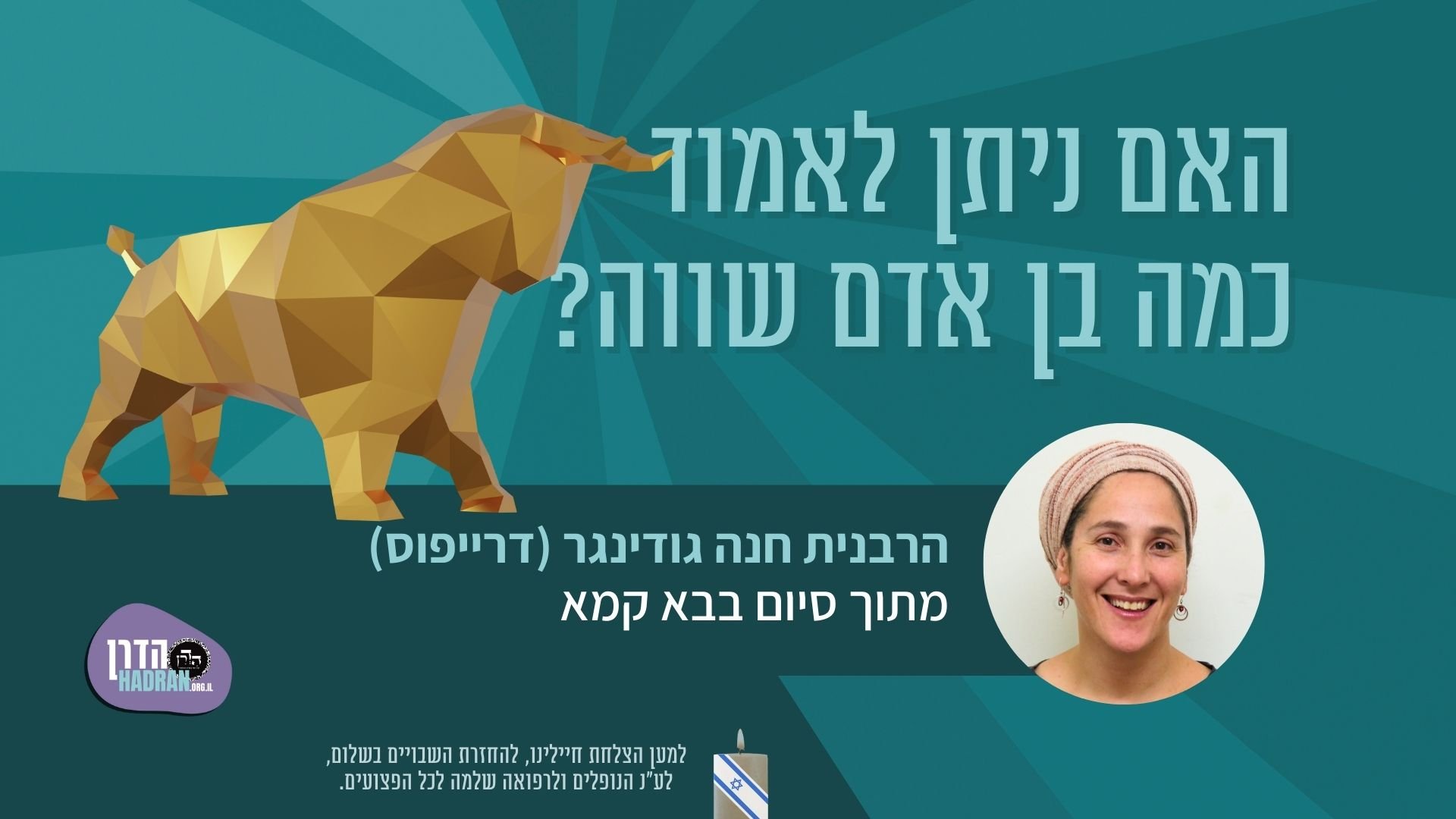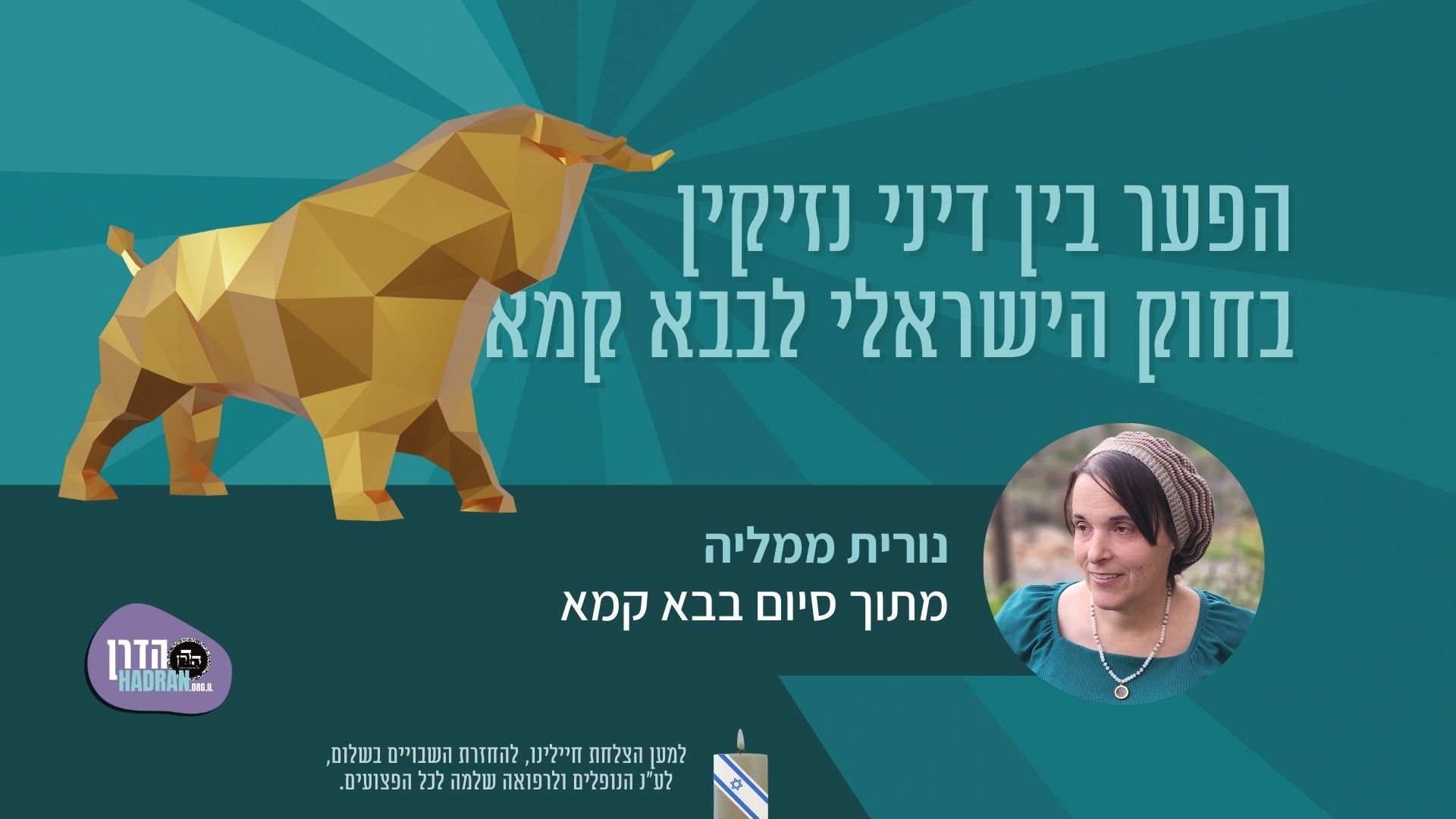בבא קמא קב
סְתָם עֵצִים – לְהַסָּקָה הֵן עוֹמְדִין.
Unspecified wood exists for fuel, i.e., charcoal, so its benefit follows its consumption.
אָמַר רַב כָּהֲנָא: וְעֵצִים לְהַסָּקָה – תַּנָּאֵי הִיא, דְּתַנְיָא: אֵין מוֹסְרִין פֵּירוֹת שְׁבִיעִית לֹא לְמִשְׁרָה וְלֹא לִכְבוּסָה. וְרַבִּי יוֹסֵי אוֹמֵר: נוֹתְנִין פֵּירוֹת שְׁבִיעִית לְתוֹךְ הַמִּשְׁרָה וּלְתוֹךְ הַכְּבוּסָה.
Rav Kahana says: And the matter of whether kindling wood, whose benefit follows its consumption, is subject to the sanctity of the Sabbatical Year is a dispute among the tanna’im, as it is taught in the Tosefta (Shevi’it 6:25): One may not transfer Sabbatical Year produce, e.g., wine, to another person; neither for soaking flax to prepare it for spinning, as the benefit derived from the flax follows its soaking, when the soaked and spun thread is woven into a garment; nor for laundering with it, as the benefit derived follows the laundering when one wears the clean clothes. Soaking the flax or laundering the garment in wine is considered the consumption of the wine, as it is no longer potable. And Rabbi Yosei says: One may transfer to another Sabbatical Year produce for soaking and for laundering.
מַאי טַעְמָא דְּרַבָּנַן? אָמַר קְרָא: ״לְאׇכְלָה״ – וְלֹא לְמִשְׁרָה, ״לְאׇכְלָה״ – וְלֹא לִכְבוּסָה. וְרַבִּי יוֹסֵי אוֹמֵר, אָמַר קְרָא: ״לָכֶם״ – לְכׇל צׇרְכֵיכֶם.
The Gemara asks: What is the reasoning for the statement of the Rabbis? The verse states with regard to Sabbatical Year produce: “For food” (Leviticus 25:6), from which it is inferred: But not for soaking; “for food,” but not for laundering. And Rabbi Yosei says that it is permitted, as the verse also states: “For you,” from which it is inferred: For you, for all your needs, even for soaking and for laundering.
וְרַבָּנַן נָמֵי, הָכְתִיב ״לָכֶם״! ״לָכֶם״ דֻּומְיָא דִּ״לְאָכְלָה״ – בְּמִי שֶׁהֲנָאָתוֹ וּבִיעוּרוֹ שָׁוִין, יָצְאוּ מִשְׁרָה וּכְבוּסָה שֶׁהֲנָאָתָן אַחַר בִּיעוּרָן.
The Gemara asks: And according to the Rabbis as well, isn’t it written: “For you”? How do they explain that term? The Gemara answers: From that term “for you” it is derived: “For you,” similar to “for food,” i.e., the sanctity of the Sabbatical Year takes effect with regard to those items whose benefit and whose consumption coincide, which excludes soaking and laundering, where the items’ benefit follows their consumption.
וְרַבִּי יוֹסֵי נָמֵי, הָכְתִיב ״לְאׇכְלָה״! אָמַר לָךְ: הַהוּא מִיבְּעֵי לֵיהּ לְכִדְתַנְיָא. דְּתַנְיָא: ״לְאׇכְלָה״ – וְלֹא לִמְלוּגְמָא. אַתָּה אוֹמֵר ״לְאׇכְלָה״ וְלֹא לִמְלוּגְמָא; אוֹ אֵינוֹ אֶלָּא ״לְאׇכְלָה״ וְלֹא לִכְבוּסָה? כְּשֶׁהוּא אוֹמֵר ״לָכֶם״ – הֲרֵי כְּבוּסָה אָמוּר; הָא מָה אֲנִי מְקַיֵּים ״לְאׇכְלָה״? ״לְאׇכְלָה״ – וְלֹא לִמְלוּגְמָא.
The Gemara asks: And according to Rabbi Yosei as well, isn’t it written: “For food”? Rabbi Yosei could have said to you: That term is necessary for that which is taught in a baraita, as it is taught: The verse states: “For food,” but not for a poultice [melogema]. The baraita continues: Do you say “for food” but not for a poultice, or perhaps it is only “for food” but not for laundering? When the verse says: “For you,” laundering is already stated as permitted since it includes all of one’s bodily needs. How do I realize the meaning of that which the verse states: “For food”? It is “for food” but not for a poultice.
וּמָה רָאִיתָ לְרַבּוֹת הַכְּבוּסָה וּלְהוֹצִיא אֶת הַמְּלוּגְמָא? מְרַבֶּה אֲנִי אֶת הַכְּבוּסָה – שֶׁשָּׁוָה בְּכׇל אָדָם, וּמוֹצִיא אֲנִי אֶת הַמְּלוּגְמָא – שֶׁאֵינוֹ שָׁוֶה בְּכׇל אָדָם.
The baraita continues. Should one ask: And what did you see that led you to include the use of Sabbatical Year produce for laundering and to exclude the use of Sabbatical Year produce as a poultice? Perhaps the opposite should be said. The baraita answers: I include the use for laundering, which applies equally to every person, as everyone needs clean clothes, and I exclude the use as a poultice, which does not apply equally to every person; it is only for the ill or wounded.
כְּמַאן אָזְלָא הָא דְּתַנְיָא: ״לְאׇכְלָה״ – וְלֹא לִמְלוּגְמָא, ״לְאׇכְלָה״ – וְלֹא לְזִילּוּף, ״לְאׇכְלָה״ – וְלֹא לַעֲשׂוֹת מִמֶּנָּה אַפִּיקְטְוִיזִין? כְּמַאן – כְּרַבִּי יוֹסֵי; דְּאִי כְּרַבָּנַן, אִיכָּא נָמֵי מִשְׁרָה וּכְבוּסָה.
In accordance with whose opinion is that which is taught in a baraita with regard to Sabbatical Year produce: “For food,” but not for a poultice; “for food,” but not for sprinkling wine in one’s house to provide a pleasant fragrance; “for food,” but not to make an emetic [apiktevizin] from it to induce vomiting? In accordance with whose opinion is this baraita? It is in accordance with the opinion of Rabbi Yosei, as, if it were in accordance with the opinion of the Rabbis, is there not also soaking and laundering that should have been excluded from the baraita, as in the Rabbis’ opinion the use of Sabbatical Year produce for those purposes is forbidden?
רַבִּי יְהוּדָה אוֹמֵר: אִם הַשֶּׁבַח כּוּ׳. (סִימָן סב״ן)
§ The mishna (100b) teaches that if the owner gave wool to a dyer to dye it red and instead he dyed it black, Rabbi Meir says: The dyer gives the owner of the wool the value of his wool. Rabbi Yehuda says: If the value of the enhancement exceeds the dyer’s expenses, the owner of the wool gives the dyer the expenses. If the expenses exceed the enhancement, he gives him the value of the enhancement. The Gemara provides a mnemonic device, the acrostic saban, for the names of the Sages involved in the following incident; each letter in the acrostic represents the middle letter of one of the names: Samekh, Rav Yosef; beit, Rabbi Abba; nun, Rav Huna.
יָתֵיב רַב יוֹסֵף אֲחוֹרֵי דְּרַבִּי אַבָּא – קַמֵּיהּ דְּרַב הוּנָא, וְיָתֵיב רַב הוּנָא וְקָאָמַר: הֲלָכָה כְּרַבִּי יְהוֹשֻׁעַ בֶּן קׇרְחָה, וַהֲלָכָה כְּרַבִּי יְהוּדָה.
The Gemara relates: Rav Yosef was sitting behind Rabbi Abba, and they were both sitting before Rav Huna. And Rav Huna was sitting and saying: The halakha is in accordance with the opinion of Rabbi Yehoshua ben Korḥa and the halakha is in accordance with the opinion of Rabbi Yehuda.
אַהְדְּרִינְהוּ רַב יוֹסֵף לְאַפֵּיהּ, אָמַר: בִּשְׁלָמָא רַבִּי יְהוֹשֻׁעַ בֶּן קׇרְחָה – אִצְטְרִיךְ; סָלְקָא דַּעְתָּךְ אָמֵינָא: יָחִיד וְרַבִּים – הֲלָכָה כְּרַבִּים, קָא מַשְׁמַע לַן הֲלָכָה כְּיָחִיד.
Rav Yosef turned his face in disdain of Rav Huna’s statement. He said: Granted, stating that the halakha is in accordance with the opinion of Rabbi Yehoshua ben Korḥa is necessary, as it would enter your mind to say that there is a principle that when there is a dispute between an individual and the many, the halakha is in accordance with the opinion of the many. Rav Huna therefore teaches us that in this case the halakha is in accordance with the opinion of Rabbi Yehoshua ben Korḥa, despite the fact that he is an individual.
רַבִּי יְהוֹשֻׁעַ בֶּן קׇרְחָה מַאי הִיא? דְּתַנְיָא, רַבִּי יְהוֹשֻׁעַ בֶּן קׇרְחָה אוֹמֵר: מִלְוָה בִּשְׁטָר – אֵין נִפְרָעִין מֵהֶן. מִלְוָה עַל פֶּה – נִפְרָעִין מֵהֶן, מִפְּנֵי שֶׁהוּא כְּמַצִּיל מִיָּדָם.
The Gemara interrupts Rav Yosef’s remark and asks: What is the ruling of Rabbi Yehoshua ben Korḥa to which Rav Huna is referring? It is as it is taught in a baraita: Rabbi Yehoshua ben Korḥa says that with regard to a loan with a promissory note, one may not collect the loan from gentiles near the time of their holidays, but with regard to a loan by oral agreement, one may collect from gentiles even near the time of their holidays, because the creditor is considered as one who salvages money from their possession.
אֶלָּא ״הֲלָכָה כְּרַבִּי יְהוּדָה״ לְמָה לִי? מַחְלוֹקֶת וְאַחַר כָּךְ סְתָם הִיא, וּמַחְלוֹקֶת וְאַחַר כָּךְ סְתָם – הֲלָכָה כִּסְתָם!
But with regard to the statement that the halakha is in accordance with the opinion of Rabbi Yehuda, why do I need it? This is an example of the Mishna recording a dispute, and afterward recording only one side of that dispute as an unattributed opinion. And the principle is that when the Mishna records a dispute, and afterward records only one side of that dispute as an unattributed opinion, then the halakha is in accordance with the unattributed opinion.
מַחֲלוֹקֶת – בְּבָבָא קַמָּא, לִצְבּוֹעַ לוֹ אָדוֹם וּצְבָעוֹ שָׁחוֹר, שָׁחוֹר וּצְבָעוֹ אָדוֹם – רַבִּי מֵאִיר אוֹמֵר: נוֹתֵן לוֹ דְּמֵי צַמְרוֹ. רַבִּי יְהוּדָה אוֹמֵר: אִם הַשֶּׁבַח יָתֵר עַל הַיְּצִיאָה – נוֹתֵן לוֹ אֶת הַיְּצִיאָה, וְאִם הַיְּצִיאָה יְתֵירָה עַל הַשֶּׁבַח – נוֹתֵן לוֹ אֶת הַשֶּׁבַח. וּסְתָם – בְּבָבָא מְצִיעָא, דִּתְנַן: כׇּל הַמְשַׁנֶּה – יָדוֹ עַל הַתַּחְתּוֹנָה, וְכׇל הַחוֹזֵר בּוֹ – יָדוֹ עַל הַתַּחְתּוֹנָה!
The Gemara identifies the dispute and the unattributed mishna. The dispute is found in tractate Bava Kamma: If one gave wool to a dyer to dye it red for him and instead he dyed it black, or to dye it black and he dyed it red, Rabbi Meir says: The dyer gives the owner of the wool the value of his wool. Rabbi Yehuda says: If the value of the enhancement exceeds the expenses, the owner of the wool gives the expenses to the dyer. And if the expenses exceed the enhancement, he gives him the value of the enhancement. And the unattributed mishna appears in tractate Bava Metzia, as we learned in a mishna there (76a): Whoever changes from the terms of an agreement is at a disadvantage, and whoever reneges from an agreement is at a disadvantage. This unattributed mishna accords with the opinion of Rabbi Yehuda, who holds that a craftsman who deviates from his assignment receives either the expenses or the enhancement, whichever is of lesser value.
וְרַב הוּנָא – אִצְטְרִיךְ; סָלְקָא דַּעְתָּךְ אָמֵינָא: אֵין סֵדֶר לַמִּשְׁנָה, וּסְתָם וְאַחַר כָּךְ מַחְלוֹקֶת הִיא. וְרַב יוֹסֵף – אִי הָכִי, כׇּל מַחְלוֹקֶת וְאַחַר כָּךְ סְתָמָא – נֵימָא: אֵין סֵדֶר לַמִּשְׁנָה, וּסְתָם וְאַחַר כָּךְ מַחֲלוֹקֶת הִיא!
The Gemara asks: And being that this is a dispute and afterward an unattributed opinion, why did Rav Huna find it necessary to state that the halakha follows the opinion of Rabbi Yehuda? It is necessary, as it would enter your mind to say that the Mishna is not sequential and, in fact, this is a case of an unattributed ruling followed by a dispute. And why does Rav Yosef disagree? He disagrees because if that is so, then with regard to every case where a dispute is recorded and afterward an unattributed opinion is recorded, let us say: The Mishna is not sequential, and this is a case of an unattributed ruling followed by a dispute.
וְרַב הוּנָא – כִּי לָא אָמְרִינַן אֵין סֵדֶר לַמִּשְׁנָה, בַּחֲדָא מַסֶּכְתָּא; אֲבָל בִּתְרֵי מַסֶּכְתּוֹת אָמְרִינַן. וְרַב יוֹסֵף – כּוּלַּהּ נְזִיקִין חֲדָא מַסֶּכְתָּא הִיא.
And Rav Huna would respond: The situation where we do not say that the Mishna is not sequential, i.e., where we say that the Mishna is sequential, is only when both mishnayot appear in one tractate, but when they appear in two different tractates we say that the Mishna is not sequential. Since these mishnayot are found in two different tractates, Bava Kamma and Bava Metzia, the assumption is that the Mishna is not sequential. And Rav Yosef would respond: All of Nezikin, i.e., Bava Kamma, Bava Metzia, and Bava Batra, is one tractate.
וְאִיבָּעֵית אֵימָא: מִשּׁוּם דְּקָתָנֵי לַהּ גַּבֵּי הִלְכָתָא פְּסִיקָתָא – כׇּל הַמְשַׁנֶּה, יָדוֹ עַל הַתַּחְתּוֹנָה; וְכׇל הַחוֹזֵר בּוֹ, יָדוֹ עַל הַתַּחְתּוֹנָה.
And if you wish, say that even if Bava Kamma and Bava Metzia are to be considered two separate tractates, Rav Yosef would still hold that Rav Huna’s statement was unnecessary because it is taught as one of a pair of established halakhot: Whoever changes from the terms of an agreement is at a disadvantage, and whoever reneges on an agreement is at a disadvantage. Since this ruling was taught with another, established halakha, it is apparent that this is also an established halakha.
תָּנוּ רַבָּנַן: הַנּוֹתֵן מָעוֹת לִשְׁלוּחוֹ
§ The Gemara notes another dispute concerning one who deviates from the terms of an agreement. The Sages taught in the Tosefta (Bava Metzia 4:20): One who gives money to his agent
לִיקַּח לוֹ חִטִּין – וְלָקַח מֵהֶם שְׂעוֹרִין, שְׂעוֹרִין – וְלָקַח מֵהֶם חִטִּין; תַּנְיָא חֲדָא: אִם פָּחֲתוּ – פָּחֲתוּ לוֹ, וְאִם הוֹתִירוּ – הוֹתִירוּ לוֹ; וְתָנֵי חֲדָא: אִם פָּחֲתוּ – פָּחֲתוּ לוֹ, וְאִם הוֹתִירוּ – הוֹתִירוּ לָאֶמְצַע!
to purchase wheat for him, which he plans to sell at a profit, and instead the agent purchased barley with the money, or if he gave his agent money to purchase barley and instead he purchased wheat with the money, two baraitot issue discordant rulings with regard to the halakha. It is taught in one baraita that if there was a loss, the loss is for the agent, and if there was a profit, the profit is for the agent as well, as he is considered to have abrogated his status as an agent by deviating from the instructions. And it is taught in one baraita (Tosefta, Bava Metzia 4:20) that if there was an agreement that both parties would split the profits from the transaction, if there was a loss, the loss is for the agent, and if there was a profit, the profit goes to the middle, i.e., the agent and the investor split the profit.
אָמַר רַבִּי יוֹחָנָן: לָא קַשְׁיָא; הָא רַבִּי מֵאִיר, וְהָא רַבִּי יְהוּדָה.
To reconcile the baraitot, Rabbi Yoḥanan said: This is not difficult. This first baraita is in accordance with the opinion of Rabbi Meir, and this second baraita is in accordance with the opinion of Rabbi Yehuda.
הָא רַבִּי מֵאִיר, דְּאָמַר שִׁינּוּי קוֹנֶה; וְהָא רַבִּי יְהוּדָה, דְּאָמַר שִׁינּוּי אֵינוֹ קוֹנֶה.
Rabbi Yoḥanan explains his rationale: This first baraita is in accordance with the opinion of Rabbi Meir, who says that a change by an agent that deviates from the terms of his assignment means that the agent acquires the item in question for himself, as in the case of one who was paid to dye wool red but dyed it black. In this case as well, when the agent purchases wheat instead of barley, or vice versa, he acquires the grain for himself. And this second baraita is in accordance with the opinion of Rabbi Yehuda, who says that a change by an agent which deviates from the terms of his assignment does not mean that the agent acquires the item in question for himself. It is acquired by the one who appointed the agent, and they split the profits as agreed. But the agent is held responsible for any loss incurred, due to his deviation from the instructions.
מַתְקֵיף לַהּ רַבִּי אֶלְעָזָר: מִמַּאי? דִּלְמָא עַד כָּאן לָא קָאָמַר רַבִּי מֵאִיר – אֶלָּא בְּמִידֵּי דַּחֲזֵי לֵיהּ לְגוּפֵיהּ, אֲבָל לִסְחוֹרָה – לָא אָמַר!
Rabbi Elazar objects to this explanation: From where do you say that the dispute between Rabbi Meir and Rabbi Yehuda extends to the case of these baraitot? Perhaps Rabbi Meir says that a change by an agent from the terms of his assignment results in the acquisition of the item by the agent only with regard to an item that is fit for use by the one who appointed the agent himself, such as wool dyed the wrong color, which is now not usable for its intended purpose. But Rabbi Meir does not say his ruling with regard to an item purchased for subsequent sale as merchandise, since it is intended to be sold for a profit in any event, and the transaction would take effect as agreed upon initially, with the agent held responsible for any loss incurred.
אֶלָּא אָמַר רַבִּי אֶלְעָזָר: הָא וְהָא רַבִּי מֵאִיר, וְלָא קַשְׁיָא – כָּאן לַאֲכִילָה, כָּאן לִסְחוֹרָה.
Rather, Rabbi Elazar said: Both this baraita and that baraita are written in accordance with the opinion of Rabbi Meir, and it is not difficult. Here, in the first baraita, it is discussing grain purchased for eating, and since the one who appointed the agent desired wheat, he does not acquire the barley. There, in the second baraita, it is discussing grain purchased for subsequent sale as merchandise, and the transaction takes effect as agreed upon initially, with the agent held responsible for any loss incurred.
מַחֲכוּ עֲלַהּ בְּמַעְרְבָא: לְרַבִּי יוֹחָנָן אַלִּיבָּא דְּרַבִּי יְהוּדָה, וְכִי מִי הוֹדִיעוֹ לְבַעַל חִטִּין – שֶׁיַּקְנֶה חִטִּין לְבַעַל מָעוֹת? מַתְקֵיף לַהּ רַב שְׁמוּאֵל בַּר סַסְרָטִי: אִי הָכִי, אֲפִילּוּ חִטִּין וְחִטִּין נָמֵי לָא!
The Gemara notes that they laughed at it in the West, Eretz Yisrael, at the explanation of Rabbi Yoḥanan, who said that according to the opinion of Rabbi Yehuda, a deviation by an agent from the terms of his assignment does not result in the acquisition of the item for the agent himself: And who informed the owner of the wheat, i.e., the seller, that he should transfer the wheat to the owner of the money? If the seller was unaware that the agent was acting on someone else’s behalf, how would the one who appointed the agent acquire the wheat? Rav Shmuel bar Sasrati objects to this rationale: If so, then even in a case where the agent was sent to purchase wheat and he purchased wheat, the one who appointed the agent should not acquire the wheat, since the seller was unaware that the agent was acting on someone else’s behalf.
אָמַר רַבִּי אֲבָהוּ: שָׁאנֵי חִטִּין וְחִטִּין, דִּשְׁלִיחוּתֵיהּ קָא עָבֵיד – וְכִי בַּעַל הַבַּיִת דָּמֵי.
Rabbi Abbahu said: The case of an agent who was assigned to purchase wheat and purchased wheat is different, as the agent is performing his assignment and, as such, he is like the customer, i.e., the one who appointed him, and it is as though the latter has purchased the grain himself.
תִּדַּע – דִּתְנַן: אֶחָד הַמַּקְדִּישׁ נְכָסָיו, וְאֶחָד הַמַּעֲרִיךְ אֶת עַצְמוֹ – אֵין לוֹ בִּכְסוּת אִשְׁתּוֹ, וְלֹא בִּכְסוּת בָּנָיו, וְלֹא בְּצֶבַע שֶׁצָּבַע לִשְׁמָן, וְלֹא בְּסַנְדָּלִים חֲדָשִׁים שֶׁלְּקָחָן לִשְׁמָן.
Rabbi Abbahu further explains: Know that the agent is viewed as an extension of the one who appointed him, as we learned in a mishna (Arakhin 24a): Concerning both one who consecrates his property and one who valuates himself by donating his fixed value to the Temple, the Temple treasury does not have any rights with regard to the donor’s wife’s clothing; and not with regard to his children’s clothing; and not with regard to new clothes colored with dye that the donor dyed for his wife or children; and not with regard to new sandals that the donor purchased for his wife or children. Presumably, the treasurer has no right to these items because they are for the personal use of the donor’s wife and children, and are considered as if owned by them.
וְאַמַּאי? לֵימָא הָכָא נָמֵי: מִי הוֹדִיעוֹ לַצַבָּע – שֶׁיַּקְנֶה צִבְעוֹ לָאִשָּׁה? אֶלָּא לָאו מִשּׁוּם דְּאָמְרִינַן [דִּשְׁלִיחוּתֵיהּ קָא עָבֵיד, וּכְיַד אִשְׁתּוֹ דָּמֵי? הָכָא נָמֵי] שְׁלִיחוּתֵיהּ קָא עָבֵיד, וּכְיַד בַּעַל הַבַּיִת דָּמֵי.
Rabbi Abbahu continues: And why is it so, i.e., why is it that the wife is considered the owner of the dyed clothing for which the husband paid? Here also, let us say: Who informed the dyer that he should transfer his dye to the wife? Rather, is it not because we say that the husband is performing his assignment and, as such, he is like an extension of his wife’s hand? Here also, in the case of one who purchases grain for another, the agent is performing his assignment, and is like an extension of the customer’s hand.
אָמַר רַבִּי אַבָּא: לֹא; כׇּל הַמַּקְדִּישׁ נְכָסָיו – אֵין דַּעְתּוֹ עַל כְּסוּת אִשְׁתּוֹ וּבָנָיו.
The Gemara rejects this explanation. Rabbi Abba said: No, the reason for the ruling of the mishna is that the intention of anyone who consecrates his property is not upon the clothing of his wife and his children, i.e., he does not intend to consecrate those items.
מַתְקֵיף לַהּ רַבִּי זֵירָא: וְכִי דַּעְתּוֹ שֶׁל אָדָם עַל תְּפִילָּיו? וּתְנַן: הַמַּקְדִּישׁ נְכָסָיו – מַעֲלִין לוֹ תְּפִילִּין! אָמַר לֵיהּ אַבָּיֵי: אִין; דַּעְתּוֹ שֶׁל אָדָם עַל תְּפִילִּין – הַמַּקְדִּישׁ נְכָסָיו סָבַר: מִצְוָה קָא עָבֵידְנָא. וְאֵין דַּעְתּוֹ שֶׁל אָדָם עַל כְּסוּת אִשְׁתּוֹ וּבָנָיו – מִשּׁוּם אֵיבָה.
Rabbi Zeira objects to Rabbi Abba’s explanation: And is it the intention of a person who consecrates his property to do so upon his phylacteries? Presumably not. And we learned in a mishna (Arakhin 23b) that with regard to one who consecrates all of his property, his phylacteries are evaluated for him and consecrated. Apparently, lack of intent to consecrate a particular item does not prevent its consecration. Abaye said to Rabbi Zeira: Yes, the intention of a person who consecrates his property is upon his phylacteries, because one who consecrates his property thinks to himself: I am performing a mitzva, and he therefore intends to include his phylacteries; but the intention of a person is not upon the clothing of his wife and his children, due to the enmity that would be engendered if he consecrated their clothing.
מַתְקֵיף לַהּ רַב אוֹשַׁעְיָא: וַהֲלֹא חַיָּיבֵי עֲרָכִין שָׁנוּ כָּאן, וּתְנַן: חַיָּיבֵי עֲרָכִין – מְמַשְׁכְּנִין אוֹתָן;
Rav Oshaya also objects to Rabbi Abba’s explanation: But is it not so that the matter of those who are obligated in valuations was taught here in the mishna, and we learned in a mishna (Arakhin 21a): Concerning those who are obligated in valuations, the Temple treasury seizes collateral from them to force them to fulfill their vow.
וְכִי דַּעְתּוֹ שֶׁל אָדָם עַל עַצְמוֹ לְמַשְׁכְּנוֹ?!
And is the intention of a person upon himself to allow the treasurer to seize collateral from him? Presumably not. Nevertheless, collateral is seized from him, proving that one’s intention does not prevent consecration. Accordingly, even if it is assumed that he does not intend to consecrate the clothing of his wife or children, the clothing should nevertheless be consecrated. Why, then, is the clothing of his wife or children not consecrated?
אֶלָּא אָמַר רַבִּי אַבָּא: כׇּל הַמַּקְדִּישׁ נְכָסָיו – נַעֲשָׂה כְּמִי שֶׁהִקְנָה לָהֶן כְּסוּת אִשְׁתּוֹ וּבָנָיו מֵעִיקָּרָא.
Rather, Rabbi Abba also holds that the reason the clothing is not consecrated is not due to his intent, and he said a different explanation: Anyone who consecrates his property becomes as one who transferred his wife’s and his children’s clothing to them at the outset. Therefore, the clothing did not belong to him at the time that he consecrated his property.
תָּנוּ רַבָּנַן: הַלּוֹקֵחַ שָׂדֶה בְּשֵׁם חֲבֵירוֹ – אֵין כּוֹפִין אוֹתוֹ לִמְכּוֹר. וְאִם אָמַר לוֹ: ״עַל מְנָת״ – כּוֹפִין אוֹתוֹ לִמְכּוֹר.
§ The Gemara presents another situation in which one makes a purchase involving a third party. The Sages taught: In the case of one who purchases a field in the name of another, he is not compelled to sell it. But if he said to him at the time of the sale: I will purchase the field on the condition that he will sell it to me, he is compelled to sell it.
מַאי קָאָמַר? אָמַר רַב שֵׁשֶׁת, הָכִי קָאָמַר: הַלּוֹקֵחַ שָׂדֶה מֵחֲבֵירוֹ בְּשֵׁם רֵישׁ גָּלוּתָא – אֵין כּוֹפִין אוֹתוֹ רֵישׁ גָּלוּתָא לִמְכּוֹר. וְאִם אָמַר ״עַל מְנָת״ – כּוֹפִין אֶת רֵישׁ גָּלוּתָא לִמְכּוֹר.
Noting the ambiguity of this statement, the Gemara asks: What is it saying? Rav Sheshet said that this is what it is saying: With regard to one who purchases a field from another, claiming that he is acting in the name of the Exilarch or another dominant figure, so that others will be discouraged from contesting the sale, the Exilarch is not compelled to sell it to him, i.e., the Exilarch is not required to provide the purchaser with documentation that the field belongs to the purchaser. But if the purchaser said to the seller: I will purchase the field on the condition that the Exilarch will provide me with that documentation, the Exilarch is compelled to sell it to him, i.e., to provide him with the documentation.
אָמַר מָר: הַלּוֹקֵחַ שָׂדֶה בְּשֵׁם רֵישׁ גָּלוּתָא – אֵין כּוֹפִין אוֹתוֹ רֵישׁ גָּלוּתָא לִמְכּוֹר. מִכְּלָל דְּמִקְנָא קַנְיָא לֵיהּ; לֵימָא פְּלִיגָא דִּבְנֵי מַעְרְבָא, דְּאָמְרִי: וְכִי מִי הוֹדִיעוֹ לְבַעַל חִטִּין – שֶׁיַּקְנֶה חִטִּין לְבַעַל הַבַּיִת?
The Gemara questions Rav Sheshet’s interpretation. The Master said: With regard to one who purchases a field in the name of the Exilarch, the Exilarch is not compelled to sell it to him. Since the baraita teaches only that the Exilarch is not required to provide the purchaser with documentation that the field is his, it can be understood by inference that the purchaser has nevertheless acquired the field for himself. Let us say that this interpretation of the baraita disagrees with the statement of the residents of the West, Eretz Yisrael, who say: And who informed the owner of the wheat that he should transfer the wheat to the customer? Since the seller assumed he was selling the field to the Exilarch, the Sages of Eretz Yisrael would hold that the sale does not take effect.
אִי מִשּׁוּם הָא – לָא קַשְׁיָא; כְּגוֹן דְּאוֹדְעֵיהּ לְבַעַל שָׂדֶה, וְאוֹדְעִינְהוּ לְסָהֲדֵי.
The Gemara rejects this: If it is due to this inference that it is surmised that the baraita is in conflict with the opinion of the Sages of Eretz Yisrael, it is not difficult, as it can be said that the baraita is discussing a case where the purchaser informed the owner of the field and informed the witnesses that he intends to purchase the field for himself.
אֶלָּא אֵימָא סֵיפָא: ״עַל מְנָת״ – כּוֹפִין אוֹתוֹ רֵישׁ גָּלוּתָא לִמְכּוֹר. אַמַּאי? וְלֵימָא רֵישׁ גָּלוּתָא: לָא יְקָרַיְיכוּ בָּעֵינָא, וְלָא זִילוּתַיְיכוּ בָּעֵינָא!
The Gemara rejects Rav Sheshet’s interpretation for a different reason. Rather, say that the latter clause is difficult, as it states that if the purchaser said to the seller: I will purchase the field on the condition that the Exilarch will sell it to me, the Exilarch is compelled to sell it to him. Why should the Exilarch be compelled to provide the purchaser with documentation? But let the Exilarch say: I do not desire your esteem nor do I desire your disgrace, i.e., I am not involved in your affairs. Since the Exilarch had not been party to the negotiations, how can a stipulation stated by the purchaser render him obligated?
אֶלָּא אָמַר אַבָּיֵי, הָכִי קָאָמַר: הַלּוֹקֵחַ שָׂדֶה בְּשֵׁם חֲבֵירוֹ, רֵישׁ גָּלוּתָא –
Rather, Abaye said: This is what the baraita is saying: With regard to one who purchases a field in the name of his friend, the Exilarch,

































